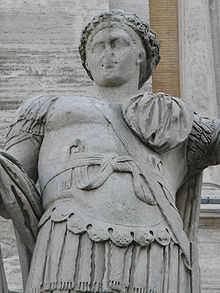Below, abridged translation from the first
volume of Karlheinz Deschner’s Kriminalgeschichte
des Christentums (Criminal History of Christianity)
______ 卐 ______
Chapter 7: The Christian Sons of
Constantine and His Successors
‘Since Constantine, the emperors were much more devoted Christians than they had ever been as pagans’.
— Frank Thiess
‘During the 4th and 5th centuries, the alliance between Christianity and the Imperium Romanum provided the inhabitants of the empire… an entirely new image of the world’.
— Denys Hay
Everything seemed very promising: a new idea of the world, the Imperium as a Christian institution oriented towards peace, the emperors turned into zealous Christians…
 Statue of Emperor Constantine II.
Statue of Emperor Constantine II.
Indeed, the sons of Constantine, Constantine II, Constantius II and Constans, along with the father, were compared by Eusebius with the Trinity. Almost since they began to walk, they were accompanied by experienced prefects, dressed in purple, in the ranks of the army. They were barely fifteen, twelve, eleven years old, and they took part in campaigns on remote fronts. Good Christians and intrepid soldiers: an ideal combination advocated for centuries by a religion of peace that has never brought peace anywhere.
The first Christian dynasty founded on family extermination
The imperial father did the pioneering work. Scarcely had he died and Constantius II, who considered himself an envoy of God and ‘bishop of bishops’, and once even practiced sexual continence, began in August 337 the extermination of almost all the male members of the imperial house in Constantinople: his uncle Dalmatius, half brother of Constantine who had lived many years surrounded by spies, and the father of Emperor Julian, Julius Constance, very hated by the Empress St. Elena, amen of six cousins and other badly seen courtesan personalities. Among these, the almost omnipotent Ablabius, prefect of the praetorians, whose daughter Olympias was promised as a child to Constantine. (Later, Constantius married her to the king of the Armenians, Arsaces III, and she was killed by the former wife of the sovereign with the complicity of a priest who mixed poison in the wine of mass.)
Christian mercy only respected Julian, who was five years old (he would be assassinated during a campaign against the Persians); his stepbrother Gallus was also saved because he was so sick that he seemed lost anyway (he would die in Istria in 354).
Constantius was a Christian, so were most of his obedient assassins, soldiers of his guard; Julian deduced from all this that ‘there is no beast as dangerous to man as Christians are to their fellow-believers’.
And just as no man in the Church had criticised the murders of relatives perpetrated by Constantine, no one censured those of the devotee Constantius, ‘one of the most notorious Christian princes of the century’ (Aland). Eusebius alludes to the ‘inspiration from above’ to justify the carnage. In Constantius one could contemplate a revived Constantine, the bishop wrote, and he was not mistaken. The praises dedicated to the multiple parricide and bellicose Constantius are almost as dithyrambic as those deserved by the military leader and exterminator of relatives, Constantine.
Paradigm of the cruelty according to Amianus, Constantius did not take long in sending a message to the bishop Eusebius of Nicomedia, the preceptor of Julian, asking him never to speak with him about the destinies of his family.
And six years later, Julian and Gallus were imprisoned in Macellum, a sinister fortress hidden between mountains— ‘without authorizing anyone to approach us, without studies worthy of such a name, without conversations, although we were surrounded by a splendid service’, remembers Julian. A secret agent of the emperor suggested Gallus, the first-born, that Constantius was not guilty of the death of his father, and that the extermination of his family had been an uncontrolled act of the soldiery.